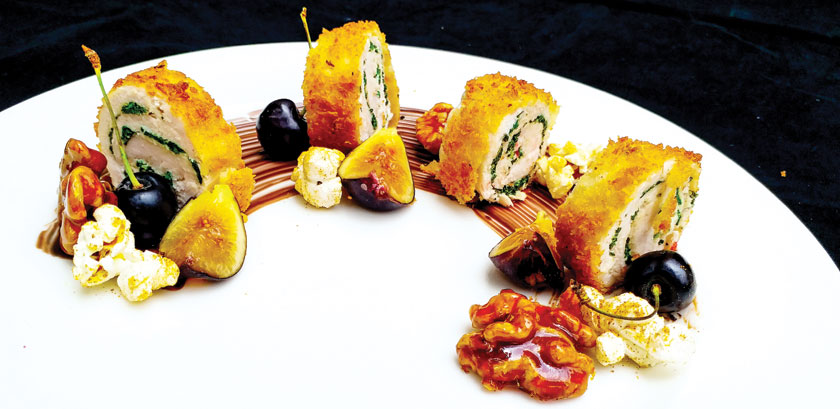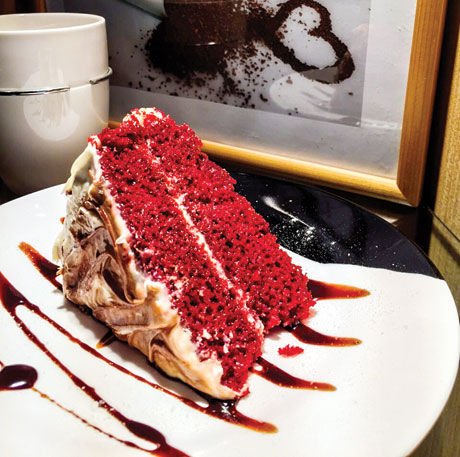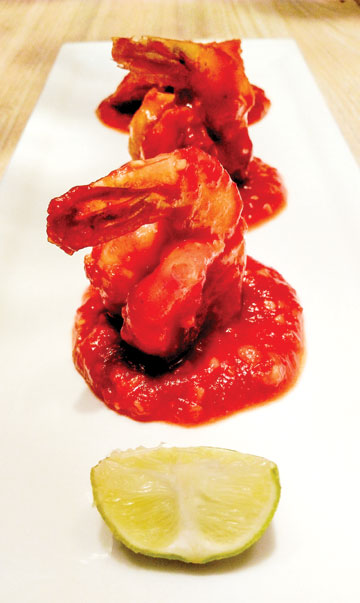COVER STORY
Gone are the days when medicine, engineering, army and teaching were the only options available to aspirants. A new world of exciting careers is now open to those who want to venture into new fields. Times are changing, and so are perceptions. Becoming a chef, which was previously not really respected is now an attractive option. Us spoke to Faisal Hassan Khan to find out what becoming a chef entails...

Tell us about yourself?
Though I have been cooking since a very early age, I wasn’t able to pursue culinary career due to resistance. There is a saying that goes “Speak your mind even if your voice shakes”, and if some people have the courage to stand up for themselves I guarantee you that would become life defining moment for anyone. That is exactly what happened with me! After some personal setbacks one summer day a few years back is what changed everything in my life for the better. I am someone with a fusion of scientific and artistic nature, and wanted to take on something that could feed my hunger for both. Hence, the field of culinary skills or culinary field has always piqued my interest.
My mentors have been the likes of Chef Nadeem Qureshi, Chef Naveed Ahmed and Chef Ali Abbas, educationally; Chef Jalal Haider and Chef Amir Iqbal industrially, while Chef Mehboob held some workshops that I attended and aided at. Chef Junaid Ahmed Yousufi has been my baking and patisserie guide professionally and academically. During my education, I started working at Ambrosia as the assistant to the Pastry Chef and was promoted to head the Garde Manger under Chef Jalal as the executive chef there. I consider myself extremely blessed; the opportunities that came my way, right while I was pursing my culinary education at College of Tourism and Hospitality Management (COTHM), were amazing. This is just the beginning and it feels really nice to see my family and close peers happy for what I have achieved so far; I’m so thankful to Allah for everything I have today!
When did you decide to become a chef?
Having grown up in Pakistan, it means a happy childhood filled with sounds, exciting scents, and, the most important of all - flavours. That’s how my maternal grandmother’s kitchen used to be like. That was from where things took off for me while I was still a preschooler. My friends and most of the family members have been very supportive of my craft and were elated when I enrolled myself into the culinary programme, but there is always some opposition, and there were definitely some snarky and disheartening comments aimed at me. “What will the people say?” “That’s a woman’s work!” “You’re changing your career path now?” “Things are not going to work for you, kid!” But thankfully that didn’t stop me from what I wanted to go for, however late that was. I’m really blessed.
I’ve been cooking since I was 12 years old, but to correctly educate myself and step into the field right way I enrolled myself for the Graduate Diploma in International Culinary Arts at COTHM that comprises an extensive programme in basics, world cuisines, baking and pastry arts.
What’s the best and least favourite part from your education experience?
What I loved was I gained an incredible amount of knowledge in a period of two years, and I could not be more enthusiastic and thankful about the whole experience. What I liked the least was that it was just two years, I would have loved to learn more, but then again that’s what the professional kitchens are for.
Do you think students should be taught culinary skills at school like they are taught reading skills for instance?
Definitely, definitely! This field is one of the fastest growing fields around the globe, and students should be taught culinary skills at school. Whatever the field might be, the right education starts from the educational institutes to make the base of anything and then progresses practically when one steps into the industry.
A chef you admire the most?
There is a long list of international chefs I admire: Alain Ducasse, Heston Blumenthal, Atul Kochhar, Pierre HermŽ, Marco Pierre White, Antonio Carluccio, Mario Batali, Mehboob Khan and Junaid Ahmed Yousufi... However, the one chef that I admire the most is Chef Jalal Haider. Primarily because I started my industrial career with him. He has a very impressive graph where he worked his way up the brigade without any intention of getting fame. His culinary skills are at par with the best. The way he teaches is brilliant. He is always calm and has a great sense of humour, which is all music to one’s ears. He told me where to look at and not what to see and that kept me challenged, motivated and sprouted my growth.
What is your favourite cuisine?
I’ve mentioned before that a true chef is who is able to cook something with any ingredients; hence, I can produce whatever I put my soul into.
My favourite cuisine would be the Mediterranean cuisine. It comprises cuisines like the French, Italian, Spanish, Greek, Turkish and Middle Eastern amongst others. The cuisine has a reputation of being flavourful, wholesome, nutritious and at the same time the colours across the platter are no less than paint on a canvas.
When are you happiest at work?
It’s not a question of a moment in time, whether it’s when I was taking my culinary classes, or when I’m cooking at home, or working in a restaurant; my work has always been my happy place.
Do you prefer working on your own or with a team, and why?
It varies, to be honest. When I am formulating a recipe, brainstorming or researching I like working on my own. Otherwise, the kitchen is a battlefield, and no one can win a battle alone without their army. A strong and honest chef’s brigade is also what is integral for their successes.
How do you handle pressure?
It was in the beginning of my industrial career that my executive chef gave me an advice that I am sure would always help me. He told me to always work with calm, and to let my mind be unbound and stress-free while aiming for betterment.
Have you ever been in a difficult situation? How did you handle it?
It was one of the tastings at Ambrosia, where we were presenting a partial menu to the people invited; but a few people who have attended the tastings before wanted their guests to try what they had tried. Hence, we had to prepare the rest of the things on the full menu with little time on hands. The goal was to take into consideration what my chefs have taught me, to formulate a plan, make my body to carry out the given task, let mind be independent and at the same time synchronous.
What do you do to stay current on new trends? What are two or three most interesting industry trends right now?
Internet, that’s how I stay current and in-practice of the new trends. Some of the interesting industry trends include molecular gastronomy, unorthodox food combinations, the fusion cuisines, the rise of organic and natural food, and less consumption of meat as compared to vegetables, amongst others.
Any favourite cookbook?
I look to cookbooks for new ideas, but I don’t usually follow the recipe to the tee. At first, I used to but now I add a twist to whatever I am cooking. The most treasured one, however, would be The Professional Chef by CIA, as it’s a book I learnt from and I still consider it to be the best standard reference that I possess. Other than that Larousse Gastronomique, The Modernist Cuisine, Escoffier, Mastering the Art of French Cooking, Flavor Bible and Professional Baking are what I would consider my top picks.
What are the key elements you look for when planning a menu?
It really depends on what the menu is being planned for, whether it’s a catering job or running a restaurant. While creating a menu the most important task is to know your consumers. Then I try to be clever with my budget and think about some innovative ideas, flavourful combinations, different colours and textures to give an impressive looking meal.
How do you test the quality of your ingredients?
For any meal to be worth remembering it always comes down to the ingredients that go in the preparation of it, whether it’s the meat, produce, spices, dairy products or oils and vinegars. There is a protocol available with set rules and guidelines to maintain the quality of the ingredients, from the time of purchase until the meal is plated and served to the customer. The food is inspected, and purchased from trusted vendors. Transportation, equipment, storage facilities need to be sanitized and then utilized correctly. The kitchen staff or anyone coming in direct or indirect contact with the food need to maintain high levels of personal hygiene and grooming. Temperature control, segregated storage and packaging all come into play. The rules of FIFO (First In First Out), FMFO (First Manufactured First Out) and FEFO (First Expire First Out) are also applied.
Tell us about your budgeting, purchasing and inventory control experience.
While working at Ambrosia, I developed an understanding of where to cut down the expenses while not compromising the quality of the food and maintaining a good inventory purchase cycle. The employer’s budget is solely responsible for the food cost and the labour. The purchase cycle basically depends on the yields, the useable products and the waste. It is integral to be aware of the customer flow; over-producing will make the cost higher, while under-producing and running out of food will damage the business. How much money is flowing in different directions has to be monitored. It is very important to develop the sense to understand where to splurge and where to budget.
Any stereotypes regarding this profession that you have heard or come across in real life?
Honestly, there are more negative misconceptions of people than the good stuff. First and foremost, a short fuse. The chefs are overworked, and have the responsibility of the whole restaurant, so that’s understood. I have seen that in professional kitchen, but my chefs have always been a delight to work with. The differences between reality cooking and TV shows, if you ever happen to be into an operating kitchen, will surely be an eye-opener to the reality cooking. Professional cooking is far from the cooking you see on television. A chef’s life is about the time restraints, fatigue and military like structure with the pressure of expectations, the hot environment - unless you work in the cold kitchen. It’s all true but all of that has been a propeller.
Another common misconception is knowing every recipe that has ever existed. Other chefs and I do have recipes stored in our memory, but we’re not walking cookbooks, and need to look them up somewhere and experiment before we can share them with anyone who asks. Another most common statement I have come across when someone discovers that I’m a chef is “You must be good at cooking” rhetorical as that must be! I remember once telling someone I just make some french fries, add masala and enjoy with a chilled drink. They chuckled; I’m glad they got the humour, though anyone who is reading might change their views. Or, someone starting out in the field might have an insight to stay away from the habits that overtake chefs all around the world.
Future plans: Do you plan to launch a YouTube channel or write a cookbook?
A cookbook, YouTube channel, a guiding platform might be an option in the future. So is a job as a culinary instructor and a food stylist.
I’d like to keep my mind open about new opportunities that come into my life, but I’ll definitely be cooking up a storm somewhere in this industry.